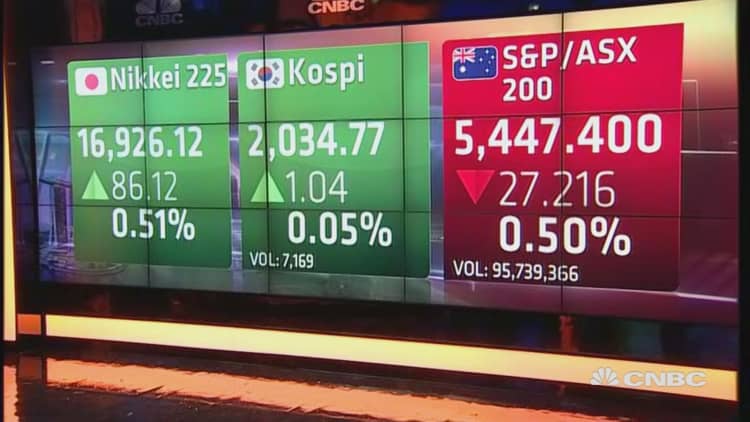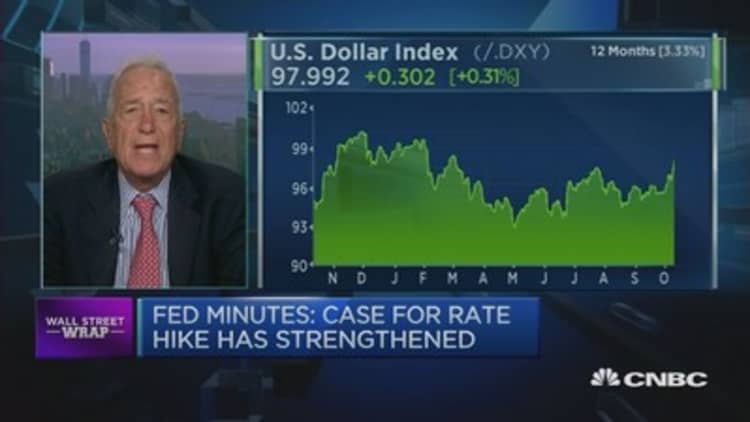Asian markets were mixed on Thursday after see-sawing following soft Chinese trade data.
Mainland Chinese markets shrugged off figures showing steeper-than-expected declines in China's dollar-denominated exports in September and an unexpected drop in imports. The was up 0.09 percent, while the Shenzhen composite gained 0.241 percent, after briefly slipping into negative territory. Hong Kong's remained under pressure, and was down 1.27 percent.
Australia's ASX 200 closed down 0.71 percent, or 39.116 points, at 5,435.5, weighed by weaknesses in its energy sub-index, which fell 1.99 percent, and an 1.1 percent decline in its heavily-weighted financials sub-index.
China's exports tumbled nearly 10 percent year-on-year in dollar-terms, and imports dipped 1.9 percent from the previous year. In yuan terms, exports fell 5.6 percent on-year, while imports rose 2.2 percent.

Shares of Samsung Electronic were up 1.43 percent, but the broader South Korean benchmark index finished down 0.9 percent, or 18.29 points, at 2,015.44.
On Wednesday, Samsung cut its third-quarter operating profit guidance by 33 percent to 5.2 trillion won ($4.66 billion), which reflected the impact of the Galaxy Note 7 recalls. On Tuesday, Samsung had announced it would halt sales and production of the fire-prone Galaxy Note 7.
The Bank of Korea held interest rates steady at 1.25 percent for the fourth consecutive month, on concerns about rising household debt. The Korean won weakened against the dollar, trading at 1,134.60 won as of 2:26 pm HK/SIN. The dollar/won was trading at levels below 1,120 last week.
The Japanese benchmark index closed down 0.39 percent, or 65.76 points, at 16,774.24, most likely on the back of China's trade data and a stronger yen. The yen strengthened against the dollar, trading at 103.79 as of 2:16 pm HK/SIN, compared to levels above 104 earlier.
Thailand's SET dropped 2.12 percent, remaining under pressure on news that the country's 88-year-old Thai King Bhumibol Adulyadej remains in unstable medical condition following haemodialysis treatment, according to a palace statement.
The SET fell by nearly 6 percent in Wednesday's afternoon session, on the back of falls in previous days as fears for the King's health grew.
On the Nikkei, Sony shares rose by 1.3 percent, after the Japanese electronics maker launched the PlayStation VR (PS VR).
Suzuki Motor surged 2.24 percent, while Toyota was up 0.2 percent, after the two automakers announced on Tuesday that they would explore a partnership, which gave both automakers stocks a boost.
"With [the] alliance specifics not yet clear, it is too early to incorporate anything into our earnings forecasts. That said, we think the alliance bodes well for the medium-term growth prospects of both companies," said Masataka Kunugimoto, research analyst at Nomura, in a Wednesday note.
"Moreover, Suzuki stands to benefit from greater efficiency in R&D and capex for autonomous driving and electric drive train technology," Kunugimoto added.
The dollar index, which tracks the dollar against a basket of currencies, was trading at 97.975. Meanwhile, the pound was down 0.18 percent against the dollar at 1.2171 in Asian trade, compared with levels of 1.24 last week.
U.S. stocks closed mixed after the Federal Reserve's September minutes reaffirmed expectations for a possible December rate hike. The minutes also showed that the three Fed policymakers who were in favor of a rate hike at the September meeting were concerned that the delay in raising rates might send the country into a recession.

The closed up 0.09 percent at 18,144.2, while the S&P 500 finished up 0.11 percent at 2,139.18. The composite ended lower by 0.15 percent at 5,239.02.
Oil prices fell in the U.S. on Wednesday after reports of higher monthly output by OPEC and American Petroleum Institute data that showed a U.S. crude inventory build for the first time in six weeks, Reuters reported.
U.S. crude futures were trading lower by 0.74 percent, or 37 cents, at $49.81 a barrel after settling at $50.18 in the U.S. session while Brent futures were down 0.64 percent, at $51.48, after settling at $51.81.
India will reveal its consumer price index (CPI) later in the day.

